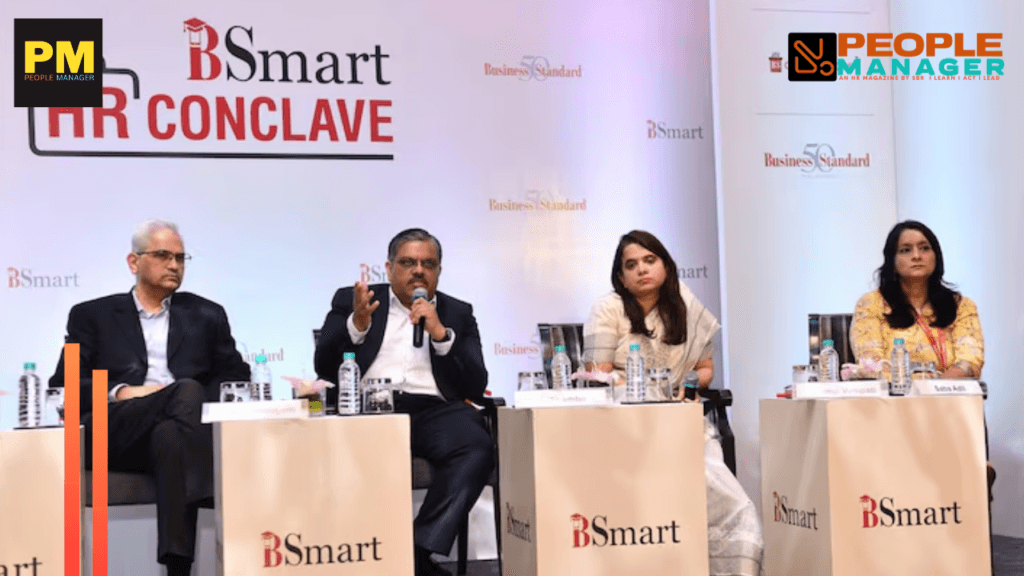HR must adapt to multi-generational workforce, tech shift: Industry leaders
Rajkamal Vempati, Head of Human Resources at Axis Bank, emphasized that talent is abundant, but the context has changed. Today's workforce comprises multiple generations, each with unique needs and expectations.

The world of Human Resources (HR) is in the midst of a seismic shift. No longer just an administrative function, HR is emerging as a critical strategic partner within modern organizations. This transformation is driven by the need for personalized employee solutions, rapid technological advancements, and changing workplace dynamics. Top HR executives from leading Indian companies converged at the Business Standard BSmart HR Conclave in Mumbai to share insights on how HR leaders can adapt and thrive in this new landscape.
The Challenge of the Multi-Generational Workforce
Rajkamal Vempati, Head of Human Resources at Axis Bank, emphasized that talent is abundant, but the context has changed. Today’s workforce comprises multiple generations, each with unique needs and expectations. The old one-size-fits-all approach no longer cuts it. HR must shift towards providing personalized solutions that cater to this diversity. “Careers are also changing,” Vempati noted, highlighting that HR’s focus is increasingly on talent scouting, nurturing, and development – making it an exciting field for those with strong analytical and problem-solving skills.
Saba Adil, Chief Human Resources Officer at Edelweiss Life Insurance, echoed this sentiment. To truly add value, HR professionals must be proactive in understanding and addressing the evolving needs of their employee population. “You have to keep reimagining the employee population,” Adil urged, stressing that responsiveness and agility are key to keeping pace with organizational and career transformations.
Embracing the Technological Revolution
Ramesh Mitragotri, Group Executive President of HR at Aditya Birla Group, delved into the profound impact of technology on job roles. While core processes remain the same, automation has revolutionized how work is performed. “Each change in technology creates a change in how a job role is looked at,” Mitragotri explained, emphasizing that technology won’t eliminate jobs, but will redefine them, boosting productivity and creating fresh opportunities. Aditya Birla Group takes a forward-looking approach, identifying and developing necessary skills up to five years in advance. Mitragotri shared how experimenting with AI tools like ChatGPT has already uncovered new opportunities within the organization.
However, not everyone agrees on the pace of technological adoption. DP Nambiar, Vice-President of HR at Tata Consultancy Service (TCS), countered that AI adoption has been swift. “It all depends on client requirements at the end of the day,” he stated. TCS has equipped 450,000 employees with GenAI skills, focusing on augmenting human capabilities rather than fueling fears of disruption.
The Remote Work Conundrum
The COVID-19 pandemic accelerated the shift to remote work, forcing organizations to adapt overnight. Nambiar shared that TCS transitioned 500,000 employees to remote work within eight weeks, with no impact on efficiency. However, concerns emerged about new hires fully grasping the company culture and values. This led to a decision to encourage a return to the office, while still offering flexibility for those who need it. “We felt there was a need to get our people back to offices so they can experience TCS for what it is,” Nambiar explained.
Rajkamal Vempati disagreed, arguing that some roles at Axis Bank will remain remote. The idea that employees only work if physically seen by managers is outdated. “Workplace is not your couch or desktop. It’s your mobile,” Vempati declared, underscoring that flexibility is a non-negotiable for today’s workforce. Organizations must be human-centered and adapt to evolving aspirations.
Ramesh Mitragotri observed that while remote work was efficient initially, it led to challenges in building rapport among new employees who never met in person. As organizations navigate this new reality, they must find innovative ways to foster connection and community in virtual and hybrid work environments.
The Future of HR: A Call to Action
The HR function stands at a crossroads. To remain relevant, HR leaders must embrace change and take a proactive, strategic approach. This means:
Personalizing Employee Solutions: Recognize the diversity of a multi-generational workforce and provide solutions that meet unique needs and aspirations.
Embracing Technology: Leverage technological advancements to enhance processes, develop new skills, and create fresh opportunities. Focus on augmenting human capabilities.
Navigating Remote Work: Find the right balance between flexibility and face-to-face interaction. Foster connection and community in all work environments.
Staying Agile: Continuously reimagine the employee population and organizational needs. Stay responsive and adapt to change at both organizational and career levels.
The future of HR is exciting, but it requires a willingness to evolve and innovate. By embracing this change, HR leaders can become true strategic partners, driving success in an ever-changing world.
Stay tuned, to PropleManager.co.in for further updates on the evolving workplace paradigm.
- FUJITRANS Corporation names Vinay Tanwar as Head – HR, India - January 16, 2026
- Duroflex Group Appoints Arkadeb Chakraborty as Chief HR Officer - January 16, 2026
- CEAT Limited Appoints Rahul Gama as SVP – Human Resources - January 16, 2026








